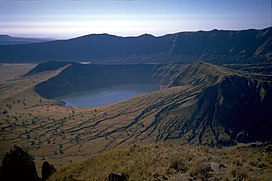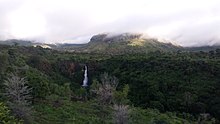Marrah Mountains
| Marrah Mountains | |
|---|---|
| Jebel Marra | |
 Inner and outer crater, Deriba Crater | |
| Highest point | |
| Peak | Deriba crater |
| Elevation | 3,042 m (9,980 ft) |
| Coordinates | 12°57′00″N 24°16′12″E / 12.95000°N 24.27000°E |
| Geography | |
| Country | Sudan |
| Region | Darfur |
| Geology | |
| Rock type | Volcanic field |
| Last eruption | 2000 BC |
The Marrah Mountains or Marra Mountains (Fur, Fugo Marra; Arabic: جبل مرة, Jebel Marra are a range of volcanic peaks in a massif that rises up to 3,042 metres (9,980 ft). They are the highest mountains in Sudan.
Geography

The mountains are located in the center of the Darfur region of Sudan on the border of the states of South Darfur and Central Darfur, with a smaller part of the range in the state of North Darfur. The highest point is Deriba Caldera. The upper reaches of the massif is a small area of temperate climate with high rainfall and permanent springs of water amidst the dry savanna and scrub of the Sahel below.[1]
Apart from the Aïr Mountains in Niger which are on the border of the Sahara proper, the Marrah Mountains are the only major mountain range in the otherwise flat Sahel, rising up to 2,600 metres (8,500 ft) above the plain, but are relatively unknown owing to lack of development and political conflict in the region.
The last eruption occurred around 1500 BC. The centre of activity was Deriba Caldera, and involved caldera collapse following the eruption of pumice and pyroclastic flows which travelled over 30 kilometres (19 mi) from the volcano.[2]
The vegetation was described by Gerald Wickens.[3]
History
In course of the War in Darfur, the Marrah Mountains fell under control of the rebel Sudan Liberation Movement/Army faction loyal to Abdul Wahid al Nur. The mountains remained one of the group's most important strongholds, housing several of its bases, as of 2021.[4]
Footnotes
- ^ de Waal, Alex, Famine that Kills: Darfur, Sudan, Oxford University Press (Revised edition), 2005, ISBN 0-19-518163-8, p. 36
- ^ "Jebel Marra: Eruptive History". Global Volcanism Program. Smithsonian Institution.
- ^ Wickens, Gerald (1976). Flora of Jebel Marra (Sudan Republic) and its Geographical Affinities. Royal Botanic Gardens, Kew. ISBN 9780112411000.
- ^ Philip Kleinfeld; Mohammed Amin (21 April 2021). "In Darfur's rebel-held mountains, the war is far from over". The New Humanitarian. Retrieved 23 April 2021.
References

